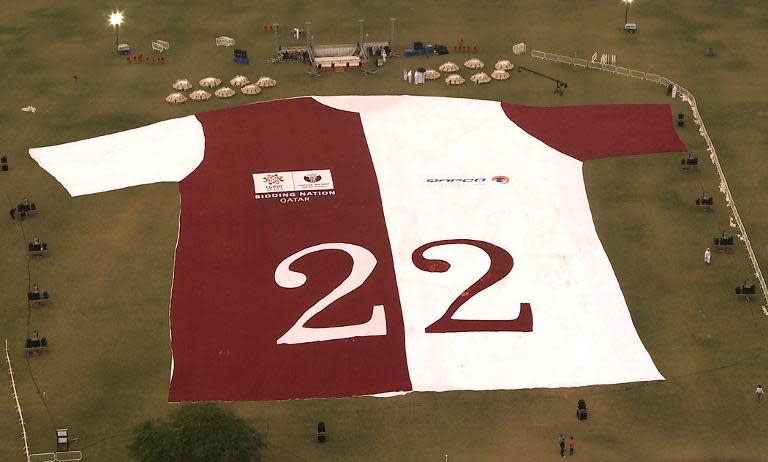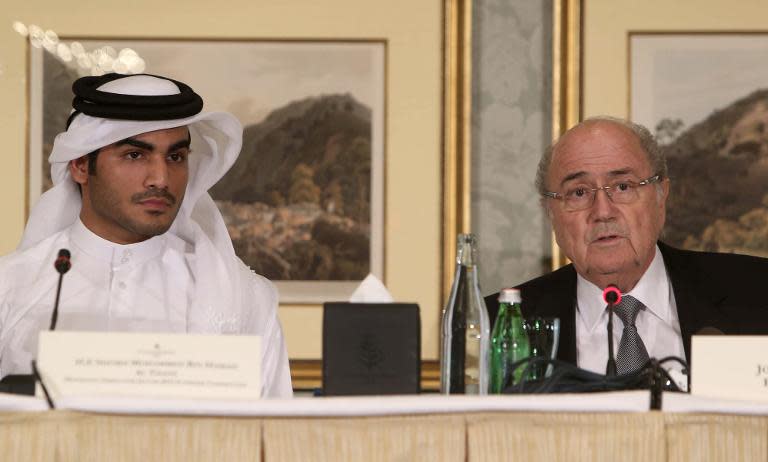Qatar comments fall-out leaves FIFA under attack
World football's ruling body came under withering fire on Thursday following FIFA secretary general Jerome Valcke's claim Wednesday that the 2022 World Cup in Qatar will be played in winter. Valcke's assertion was quickly refuted by FIFA but that didn't stop a storm breaking out over the whole affair. And UEFA chief Michel Platini was quick to stick the boot in, accusing the world football governing body of making arbitrary decisions beyond its remit. As UEFA president, Platini sits on the FIFA Executive Committee, headed by FIFA president Sepp Blatter, but he claimed Valcke's comments suggested that body was being bypassed by FIFA's top dogs. "At the last Executive Committee meeting in October it was decided that a deep consultation process should be launched throughout football and that no decision would be taken before the 2014 World Cup in Brazil," Platini told French sports newspaper L'Equipe. "It was also decided that no-one should speak about this subject until then. "Therefore I don't understand why it has been discussed publicly. Two months ago it was Blatter who spoke about it, this time it's Valcke, but it's a decision to be made by the FIFA Executive Committee. "But maybe the Executive Committee no longer serves any purpose. If the decision has already been made then there's no need for us to meet. "Essentially, some people like to talk." European media were quick to pick up on the internal strife with Italy's La Gazzetta dello Sport running the headline: "Qatar 2022 chaos: when will it be played?" Gazzetta went on to say: "It's still 'only' nine (sic. eight) years away but already Qatar 2022 is the most complicated World Cup in history. "One of the problems -- and not the only one given the union conditions of local (foreign) workers -- is: when will it be played?" France's L'Equipe was no less damning of the conflicting noises emanating from FIFA's halls. "FIFA hit by cold snap," it said, before adding: "By announcing a little prematurely the 2022 World Cup's displacement to winter, general secretary Jerome Valcke has created a new turmoil in world football." On Wednesday, the second most powerful man in international football, told Radio France: "The dates for the World Cup (in Qatar) will not be June-July. "To be honest, I think it will be held between November 15 and January 15 at the latest." FIFA were quick to issue a statement insisting he was merely expressing his personal opinion rather than official policy. But such a move would cause havoc in many European leagues and perhaps the most angered by Valcke's words were the English. Oliver Kay, the chief football correspondent for Britain's The Times newspaper seemed resigned to the move. "It was another careless, premature statement from one of the most powerful men in world football, but it pointed to two inescapable truths," he wrote. "The first is that the 2022 World Cup will not take place in the summer heat of Qatar. The second is that, for all its talk of 'very deep consultations', Fifa is merely going through the motions before rubber-stamping the first winter World Cup." Another newspaper, The Daily Mirror, was equally indignant. "Switching the World Cup to winter would spark chaos in leagues across the world, including the Premiership (Premier League), as they struggle to play fixtures with games in November, December and January scrapped." Players in England took to social media outlet Twitter to vent their fury. "World Cup in mid season #clueless #shambles," wrote West Bromwich Albion and Ireland full-back Steven Reid. It wasn't all doom and gloom, though, as in Spain the Football League president Javier Tebas urged all interested parties to simply roll up their sleeves and make the best of it. "Everyone needs to make an effort, but it doesn't seem to me to be particularly serious, it's not that dramatic," he said in an article in El Pais. "Everyone has to make concessions so that the World Cup can go to every part of the world. "We can't discriminate against one area because their summer temperatures are too high." One of the main concerns over high summer temperatures was for fans who risk being exposed to direct sunlight with temperatures topping 40 degrees Celsius. But Kevin Miles, chief executive of the Football Supporters Federation in England, says moving the World Cup to winter would also affect fans. "It is going to be seriously destructive to English football, and no doubt unpopular with fans," he said. "Massive decisions are being taken over the heads of supporters without any consultation with them."





